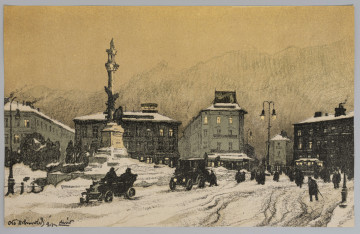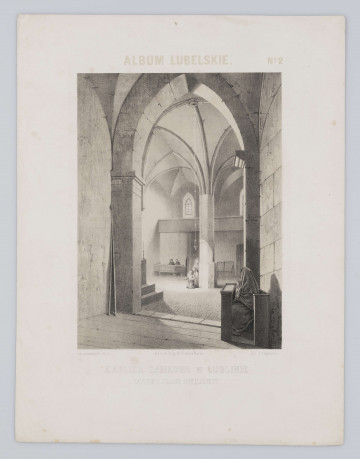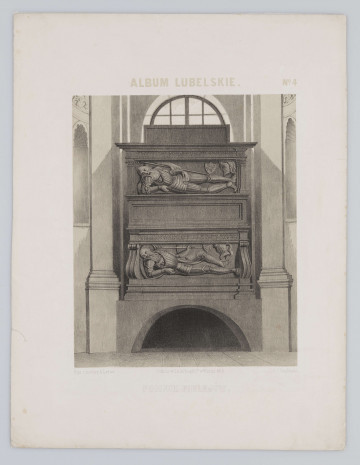
Portfolio Lviv - Maryacki Square
1915
National Museum in Lublin
Part of the collection: Lubliniana. Painting views of Lublin and the Lublin Region
The alleged unusual tombstone of Jan Baptysta Tęczyński, the owner of Kraśnik, and his fiancée Cecilia Waza, a Swedish princess, is one of several valuable modern tombstones in the Church of the Assumption of the Blessed Virgin Mary in Kraśnik (until 1865 the Canons Regular). This monument is related to the story of the tragic love between a young Polish magnate and his peer, the beautiful and educated daughter of the Swedish king Gustav I Vasa.
Jan Baptysta Count Tęczyński (1540-1563), the only son of Stanisław Gabriel, castellan of Lviv and voivode of Krakow, was the youngest senator of the Republic of Poland; he also held the offices of the voivode of Bełz (1563) and district governor of Lublin (1560-1663). His thorough education received in France, supplemented by travels combined with diplomatic missions in the Iberian Peninsula, decided that King Sigismund Augustus trusted him. On 20 July 1561, he headed a Polish mission to Sweden with the aim of arranging the marriage of Catherine Jagiellon to John Vasa, brother of King Eric XIV. The young diplomat completed the mission successfully. During the mission he fell in love with Cecilia, sister of the Swedish ruler. Erik XIV agreed to the young Tęczyński's proposal, and he returned to Poland in autumn. At the end of the year, a prenuptial agreement was drawn up. However, Erik XIV withdrew his consent to the marriage at the beginning of 1563. Jan Baptysta decided to resume negotiations concerning the marriage. In the autumn of the same year he set off with a 100-person retinue to Sweden to win the hand of the princess. Unfortunately, due to the clashes between the Danish and Swedish squadrons on the Baltic Sea at that time, Tęczyński was taken prisoner by the Danes and imprisoned in Copenhagen, where he died at the end of the year. The magnate's body was brought to Poland and buried in the church in Kraśnik.
The story of the unfulfilled love inspired writers and artists. It was supposedly evidenced by the Mannerist tombstone in the Kraśnik church made in Santi Gucci's workshop around 1604-1605. The carved figures of two young people holding hands and embracing each other in the shape of a heart were supposed to represent Tęczyński and his beloved.
According to later research, the figures are the deceased children of Andrzej Tęczyński, who owned Kraśnik after the death of Jan Baptysta until 1579.
Renata Bartnik
Author / creator
Dimensions
cały obiekt: height: 27,3 cm, width: 34 cm, diameter: 18 cm
Object type
graphics
Technique
lithography
Material
paper
Creation time / dating
Creation / finding place
Owner
The National Museum in Lublin
Identification number
Location / status

1915
National Museum in Lublin

1857
National Museum in Lublin

1857
National Museum in Lublin
DISCOVER this TOPIC
National Museum in Szczecin
DISCOVER this PATH
Educational path